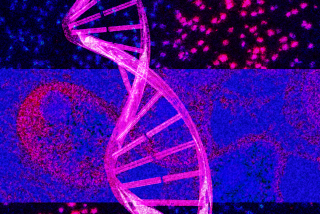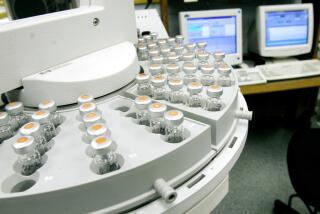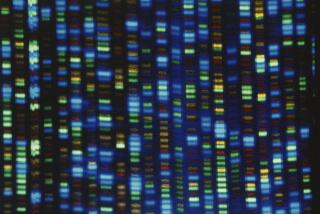Ashcroft Pledges to Speed Up DNA Analysis
- Share via
WASHINGTON — The state crime lab in Virginia was so swamped when jailed shoplifter Christopher Banks fell under suspicion in a rape case three years ago that his DNA sample sat untested for months.
Banks was freed from jail in the interim, and 11 days later he struck again. This time, he raped and killed a 22-year-old Norfolk woman, setting off a round of finger-pointing in Virginia over a death that might well have been prevented.
With hundreds of thousands of DNA samples sitting untested in crime labs across the country, Atty. Gen. John Ashcroft on Wednesday committed more than $30 million to ease the backlog.
The plan, setting in motion legislation that was signed into law by former President Clinton last year, gives the states a much-needed dose of funding to analyze DNA samples taken from both incarcerated offenders and unsolved crime scenes.
“DNA technology can operate as a kind of truth machine, ensuring justice by identifying the guilty and clearing the innocent,” Ashcroft said. “[But] backlogs of unanalyzed DNA samples and unacceptable delays in analysis of crime-scene DNA evidence are now preventing full utilization of this remarkable technology in solving crimes and promoting justice.”
Some critics said the plan may represent too little, too late in the battle to harness the full potential of DNA to fight crime.
“These funds are needed and will certainly help, but the states’ needs go well beyond this step,” said David Carle, a spokesman for Sen. Patrick J. Leahy (D-Vt.), chairman of the Senate Judiciary Committee.
Defense attorney Peter Neufeld, co-founder of the Innocence Project, a New York group that has used DNA evidence to help free dozens of prisoners, said he was particularly disappointed that Ashcroft did not endorse Leahy’s proposal to make DNA available to death row inmates and other offenders and to prevent the premature destruction of biological evidence.
“This is certainly a positive first step . . . but it’s very shortsighted and fundamentally unfair” to commit new money for DNA testing without ensuring that convicted offenders have access to the technology to try to prove their innocence, he said.
Nor did the Bush administration include any money in its current budget to fund an $85-million “bricks and mortar” plan that Congress approved last year in an effort to build more accredited crime labs across the country.
Ashcroft, however, said the $30 million committed Wednesday marked a “substantial resource.”
“We’ll monitor . . . how these funds are used and their effectiveness, and then we’ll collaborate with the Congress to see what else might be needed,” he said.
With the advent of DNA technology in recent years as a nearly foolproof modern-day fingerprint, forensics experts have been unable to keep up with the demand for testing. Many states have approved new laws and funding to better utilize DNA--in California, for instance, Gov. Gray Davis’ budget this year included $6.2 million for analysis--but the nationwide backlog has continued to grow.
Authorities estimate that more than 180,000 rape kits, containing semen samples and other evidence from victims, are sitting in crime lab storage lockers around the country, awaiting testing. An additional 750,000 samples from convicted offenders also are waiting to be tested.
Crime scene evidence can often take six months to a year to analyze. The problem has grown so severe, Ashcroft said, that some police investigators don’t even bother submitting rape kits to crime labs when they do not have a suspect because they don’t think the material will ever get analyzed.
Ashcroft said the Banks case--in which the defendant was ultimately sent to prison for life after DNA linked him to two rapes and a murder--illustrates the consequences of a “missed opportunity” caused by untested samples.
The new federal funding, which will be made available to states that apply for grants, is aimed at ensuring the analysis of 500,000 samples from convicted offenders and hundreds of thousands more from crime scenes during the next 18 months, officials said.
More to Read
Sign up for Essential California
The most important California stories and recommendations in your inbox every morning.
You may occasionally receive promotional content from the Los Angeles Times.













